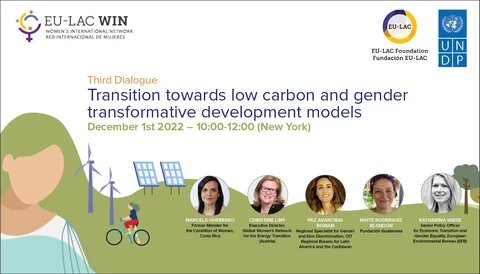On December 1, 2022, the EU-LAC Foundation and the United Nations Development Programme (UNDP) for Latin America and the Caribbean, through the EU-LAC International Women's Network (EU-LAC WIN), successfully held the dialogue "The transition to just and low-carbon economies and new gender-transformative development models". This dialogue represented the third in a series of interregional dialogues on gender and climate action in Latin American and Caribbean countries (LAC), the European Union (EU) and its member countries. On this occasion, the aim was to generate a space to address the challenges and opportunities of designing a green, fair and gender-transformative development agenda. Around 200 people from both regions attended the virtual event.
The event was opened by Anna Barrera, Senior Programme Coordinator of the EU-LAC Foundation, and Andrea Quesada, Gender, Sustainable Development and Environment Specialist of the UNDP Regional Center for LAC. Both recalled the role played by women as key actors in the transition processes to low-carbon economies and the need to promote their inclusion in new green jobs. In addition, they stressed the need to connect the climate and development agendas with the gender equality agenda to successfully move towards sustainable solutions.
The welcoming remarks were followed by the presentation of good practices. Anna Barrera presented the Women in power for green economy (Women4Green) initiative, a project involving several European countries that aims to increase the inclusion of young women in green jobs through workshops with women leaders in the green economy, guides on the necessary professional skills to work on green jobs and other teaching materials. Andrea Quesada presented a project implemented in Belize that seeks to increase the participation of women as coral reef restoration professionals and tour guides through training sessions.
The presentation of case studies was followed by a dialogue with the invited experts. The invited speakers were Marcela Guerrero, former Minister for the Condition of Women of Costa Rica; Christine Lins, Executive Director at the Global Women's Network for the Energy Transition of Austria; Paz Arancibia, Regional Specialist on Gender and Non-Discrimination at the Office of the International Labor Organization (ILO) for Latin America and the Caribbean; Maite Rodríguez, Programme Coordinator of the Guatemala Foundation; and Katharina Wiese, Senior Policy Officer for Economic Transition and Gender Equality at the European Environment Agency.
The panelists highlighted the need to guarantee women's access to training programs and exchange sessions with women role models to contribute to their empowerment and strengthening of their professional skills in the green and sustainable economy. Likewise, they emphasised the need for more data and indicators so as to facilitate the monitoring of women’s participation in decision-making on the transition to new development models and new green jobs, guaranteeing the mainstreaming of gender-transformative approaches. In addition, they identified the importance of rescuing and strengthening climate adaptation and resilience actions at the community and local level, and incorporating the knowledge of women-led community-based organizations in policies towards new development models.
The panel with the experts was followed by an interactive dialogue with those attending the event moderated by Andrea Quesada. During the dialogue, an interactive tool was made available to gather the opinions and perspectives of many of the participants. The dialogue was focused on two guiding questions: What challenges can women face during a transition to green and inclusive economies and productive systems? and what concrete and innovative actions should be implemented so that women can benefit from a transition to green, inclusive and gender-transformative economies and productive systems? One of the most frequently mentioned challenges for women’s labour inclusion and participation in climate governance was the burden of care, which falls mainly on women.
Anna Barrera and Andrea Quesada thanked for the third interregional dialogue and announced the preparation of a policy note derived from the dialogues on climate action and gender that seeks to systematise the content and offer concrete recommendations. They also invited the attendees to join the upcoming events of the EU-LAC International Women's Network.
